Meet Monsanto’s Everlyn Musyoka
One of the Women Leaders in Africa’s Agriculture
Who is Everlyn Musyoka?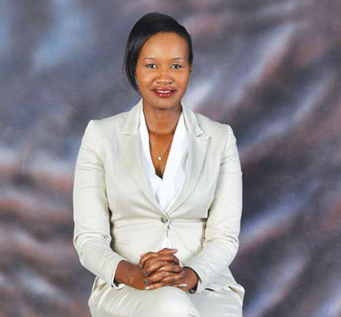 Everlyn Musyoka is the Commercial Operations Lead, Monsanto in charge of the corn and crop protection business for Kenya and Uganda. Everlyn is an experienced professional with ability to lead innovations, productivity improvements and sustainable revenue growth. She is knowledgeable and experienced in areas of finance and administration, business development as well as sales and marketing management having worked as an Accountant, Sales Representative, Departmental Manager as well as Commercial Operations Management.
Everlyn Musyoka is the Commercial Operations Lead, Monsanto in charge of the corn and crop protection business for Kenya and Uganda. Everlyn is an experienced professional with ability to lead innovations, productivity improvements and sustainable revenue growth. She is knowledgeable and experienced in areas of finance and administration, business development as well as sales and marketing management having worked as an Accountant, Sales Representative, Departmental Manager as well as Commercial Operations Management.
My career began at Amiran Kenya Ltd where I gained valuable insights in agribusiness especially in the seed sector.
There is much more to me inside and outside Monsanto. I am currently an executive member of the Board -Seed Trade Association of Kenya (STAK) a membership organization drawing members from various actors in the seed value chain both the public and private sector. In addition, I serve in the Special Interest Group (SIG) -Field crops for the continental seed body Africa Seed Trade Association (AFSTA).
I am passionate about consistency, efficiency and profitability, key factors that lead to enhanced responsiveness to customer needs as well as business sustainability. This is what keeps me awake at night as I strive to improve myself or acquire new skills relevant to this dynamic sector. I am a certified business processes and performance consultant.
How would you describe your time as the Commercial Lead Kenya -at Monsanto? Are you passionate about what you do?
My journey as the Commercial Lead has been quite exciting. I have gained various competencies and leadership insights along the way. I have been given equal opportunities to learn and develop myself as a leader and I have come to appreciate that gender is not a barrier to success. Success is a mindset.
I am passionate about what I do. I am driven by a burning desire to positively impact lives of people around me, the team I lead including our farmers who keep us in business. I am passionate about people. I want to leave a positive impact as I engage with various stakeholders within the industry as well. Continuous self-development and that of my team are central to staying abreast in this exciting industry that touches lives of millions.
What is Monsanto’s vision in the region?
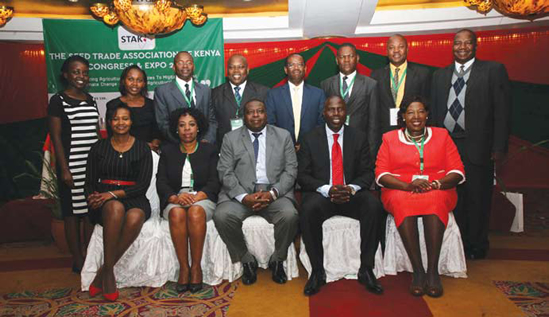
Monsanto is all about sustainable Agriculture, improving lives and creating long-term shareholder and stakeholder value amidst the daunting challenges of climate change, growing population and declining arable land amongst other global challenges. The team at Monsanto work collaboratively with stakeholders to improve livelihoods around the world. In Africa, we are working alongside farmers and other partners to make agriculture more sustainable, more productive and profitable so that growers can meet the demanding needs of today while preserving the planet for tomorrow’s generation.
Kenya is home to Monsanto’s headquarters in Africa and is currently operating from 3 sites in the country. Our Africa Headquarters in Nairobi are located at Westcom Point Building in Westlands off Waiyaki Way, at Mahiga Mairu Road.
How significant is maize to Kenya’s agriculture and how does Monsanto relate with farmers? In Kenya, like in most of Sub Saharan Africa, agriculture is the backbone of the economy with maize as a staple food product constituting 87% of household diets in Kenya alone. 75% of the Kenya population is dependent on agriculture either directly or indirectly. We continuously engage farmers as our number one partners and work towards delivering transformative agricultural products and solutions that meet our growing food needs while conserving our natural resources and the fragile environment.
There is a huge opportunity for farmers to experience our high-quality brands and other technologies enjoyed by grower’s worldwide.
What are your top priorities?
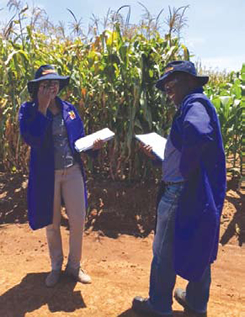
Success in agriculture starts with farmers having access to quality seed and adherence to the correct agronomic practices. At Monsanto, we believe that farming can be a lucrative business. As a leading global provider of agricultural technologybased tools and products, our priority is to provide effective support to our farmers by assisting them to access our quality products so that they improve farm productivity/yields and food quality at competitive prices. By availing high quality seeds (Dekalb and Seminis brands) to farmers in the sub Saharan region we will also continue to educate farmers on the benefits of conservative tillage and expose them to the benefits of the crop protection portfolio that includes Roundup and guardian Max brands.
In a nutshell describe Monsanto products and services to the farmers
Maize Seeds:
At Monsanto, we pride ourselves in the quality of our seeds and agricultural innovations. Our primary goal is to provide excellent seed varieties. In Kenya Monsanto offers hybrid maize seeds under our DEKALB brand with the various varieties suited for different maturity periods, climatic conditions and altitudes. Our DEKALB varieties are known for the strong specs that include high yielding varieties, drought tolerance, resistance to diseases such as Leaf Rust, Maize Streak Virus (MSV), Grey Leaf Spot (GLS) and Diplodia. In November 2016, Monsanto successfully unveiled a new maize variety in the market (DK 777) that is tolerant to MLND for farmers in the mid rift areas of Bomet and surrounding areas.
DEKALB hybrid varieties are responsive to good management and thus yields can be enhanced by adopting good agronomic practices.
Vegetable Seeds:
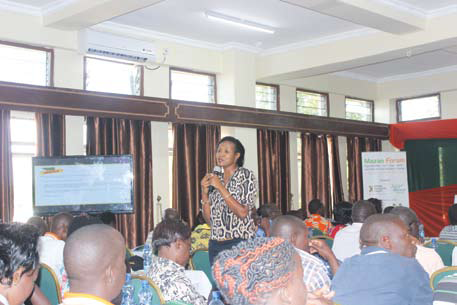
Farmers in the region have reaped the benefits of hybridization overtime. Seminis has led the way in ensuring accessibility to very high quality vegetable seeds that include; Tomato, onions, French beans, Sweet peppers, Cabbages, Watermelons, Cucumbers, Carrots and Brocolli.
Seminis is focused on developing products that reduce the need for agricultural chemicals, increase crop yields, longer shelf life addressing the constant post harvest challenges as well as better tasting foods with higher nutritional content.
Crop Protection:
In addition to our DEKALB and SEMINIS brands, we manufacture Roundup, the world’s best selling herbicide which is used for weed control by both large and small scale holders. In Africa, Roundup has been a popular choice for farmers for over two decades. We’ve got a range of selective herbicides in our portfolio as well.
Briefly discuss the Monsanto team
One of Monsanto’s strength lies in the quality and deep experience of our people. We have a highly qualified and motivated team. We value diversity and developing teams is core to our business. The team is multi-cultural/multi-racial and highly empowered -acting local whilst thinking global. The HR Team focuses on talent acquisition and development. We are a highly collaborative team focused on serving the customer and striving to deliver value and great experiences to our stakeholders in the region and beyond.
Lately we have seen a more aggressive seed sector, what can you attribute this to?
Food security is central to many national governments and international agencies such as the United Nations. The need for food security, improved livelihoods, advancement in technology and an informed farmer has immensely contributed to the rapid growth in the sector. Enabling seed policies and regional harmonization has contributed to this growth as well. As the world’s population continues to grow and climate change remains an issue, the seed sector will assume greater significance.
What’s the biggest challenge YOU feel your farmer faces, and how do you inspire the rest of the team to meet it head on?
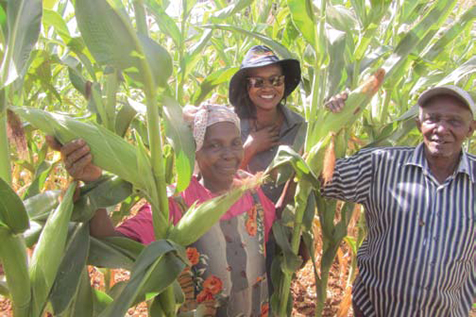
At Monsanto, we see challenges as new opportunities. Access by our farmers to quality seeds and modern agricultural technologies is key. Untapped opportunities with hybrid seeds especially for farmers who are still using open pollinated varieties, small scale holders who still don’t have access to high quality seeds as well as access to agronomic extension services will be key in seeing farmers reap higher yields and returns. This in turn will help transform and modernise agriculture across all geographies.
Where do you see the seed sector globally in the next 5 and 10 years from now? How are you prepared for this change in the industry?
This is largely speculative. Agricultural technology shall continue to take centre stage as the reality of climate change and reducing arable land in the face of a growing world population becomes apparent. Within the region we anticipate more regional harmonization based on economic blocks and more sector enabling policies.
What is your personal work ethic, and how does this affect the company culture?
Hard work and competency is key to every successful venture. Strength of character and integrity is critical and is part of who I am. I endeavour to network professionally, challenge and stretch myself while continuously learning to improve my skills. In Monsanto, personal development is quite critical and am glad to have people who coach me and mentor me to be a better leader. The biggest room in this world is the room for continuous improvement!
What decisions have you made in your career that you look back on and feel were mistakes and what have you learned from them?
Keeping my eyes on the prize amidst an environment where distractions are inevitable. I think every failure is a learning opportunity. I see lots of positive things along my career path and I celebrate the successful moments I have enjoyed along the way.
Describe your ordinary day? Do you have enough personal time?
I am very lucky to work for an organization that advocates and encourages work life balance. With proper and careful planning, you can always achieve your business goals as well as your personal wellbeing. I am also privileged to work for a respected agriculture multinational that believes in and promotes women empowerment.